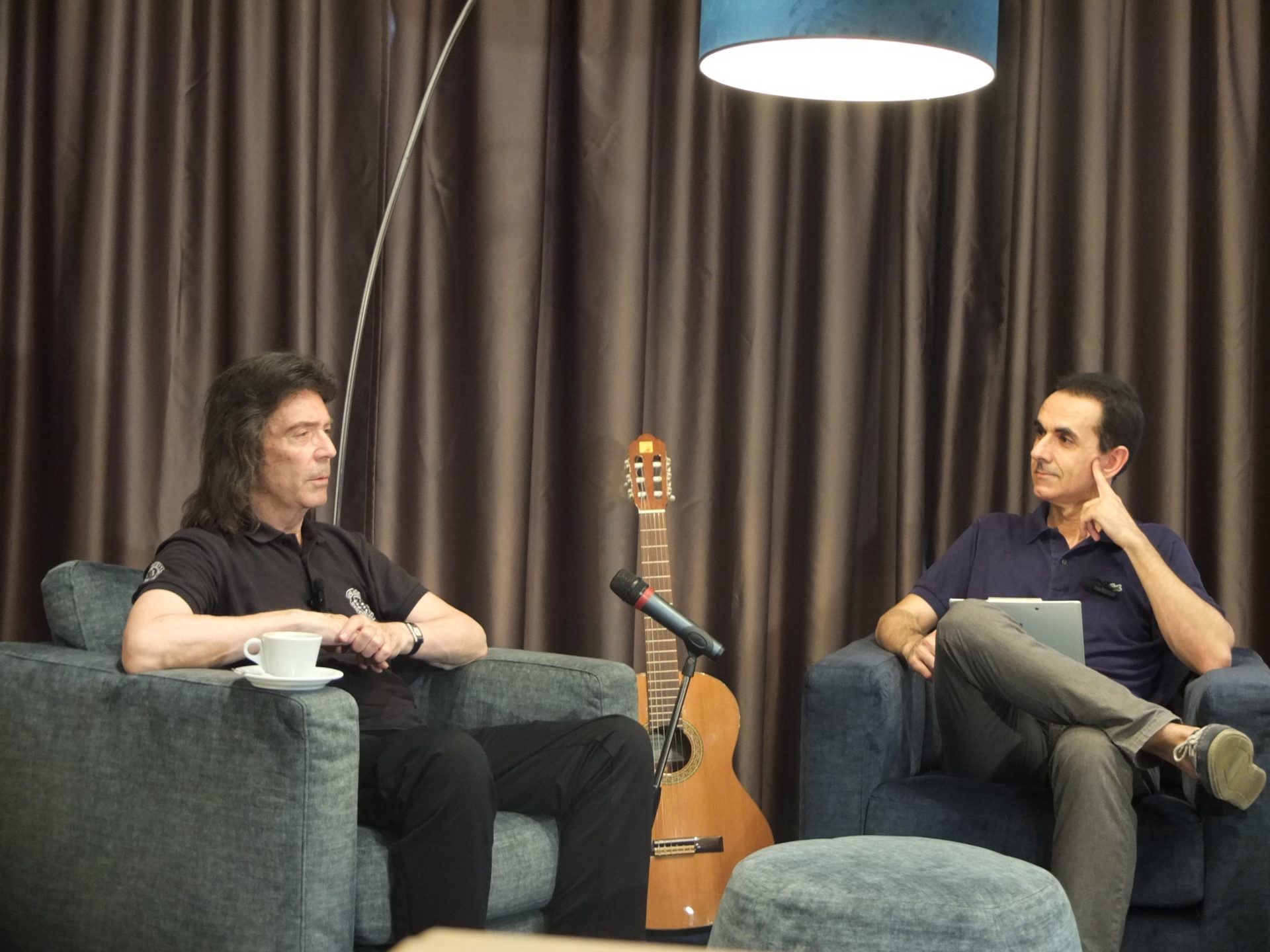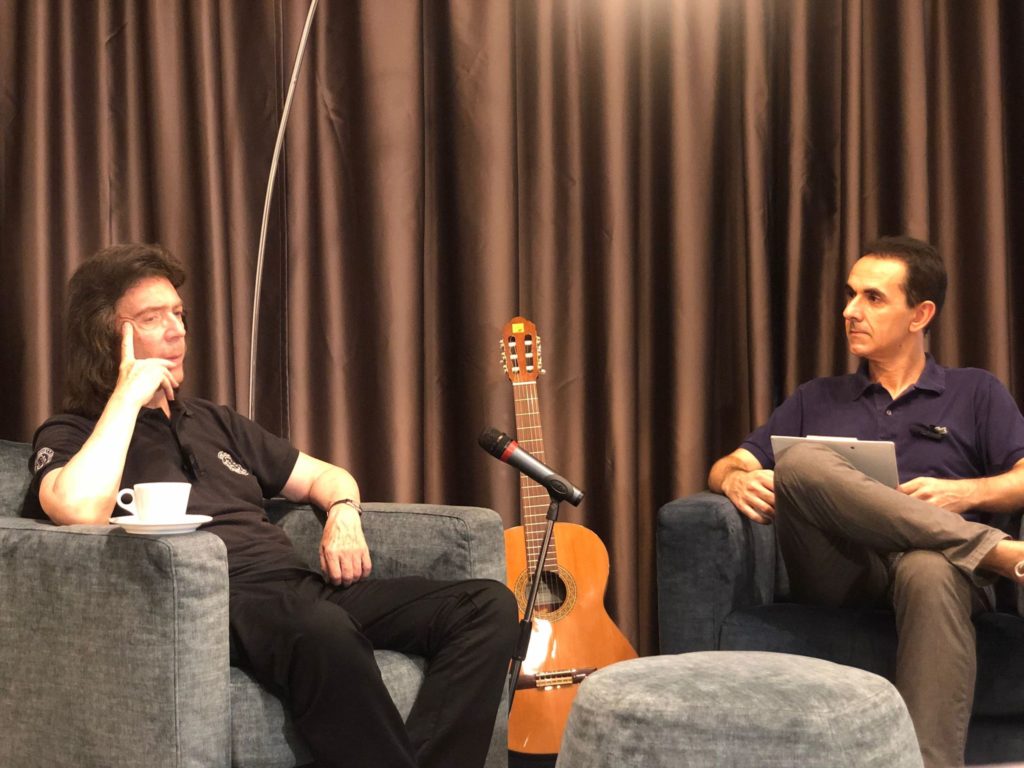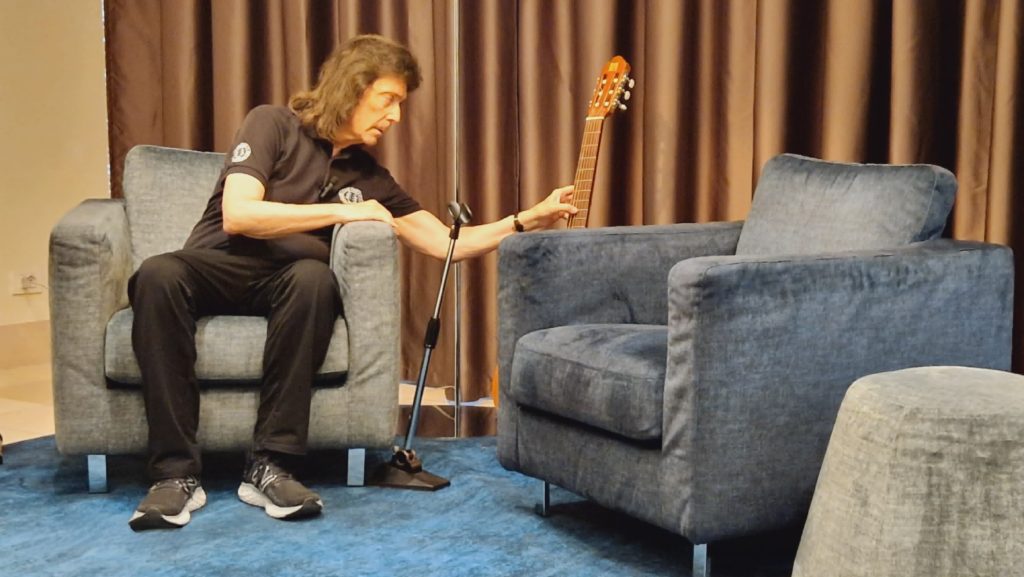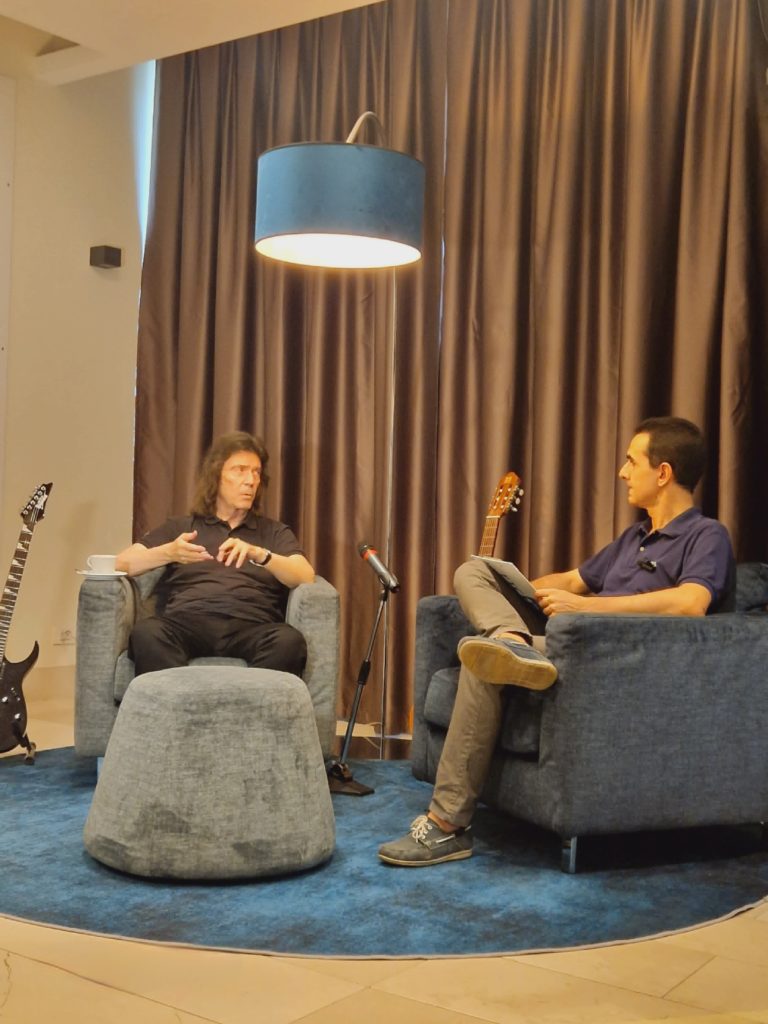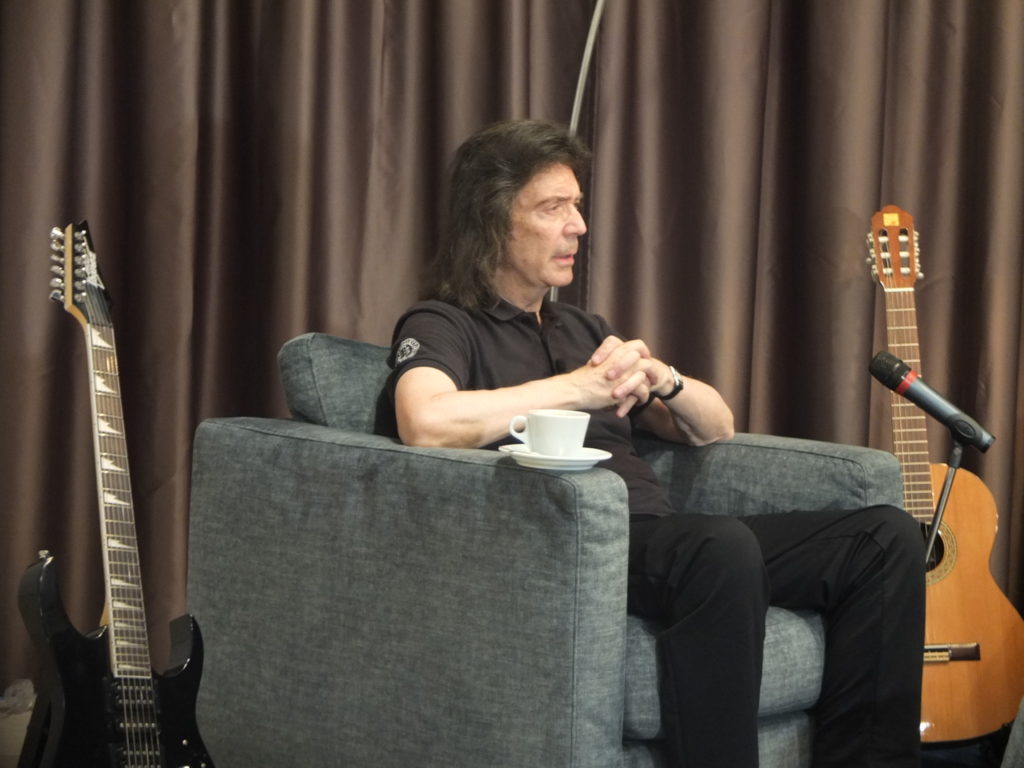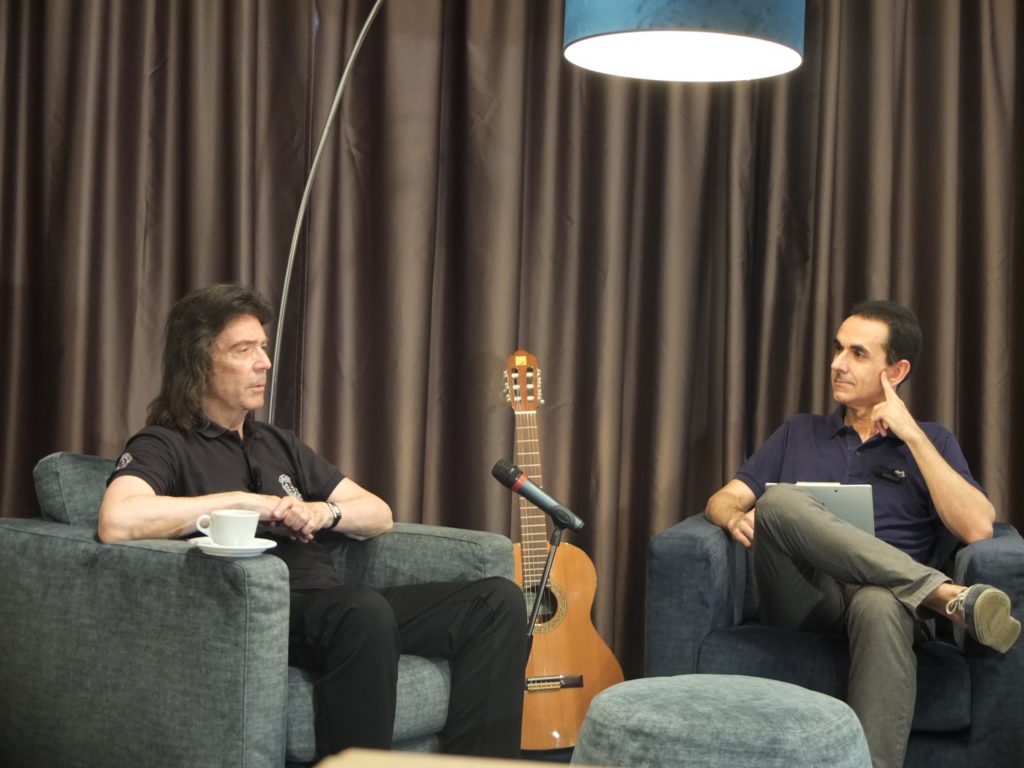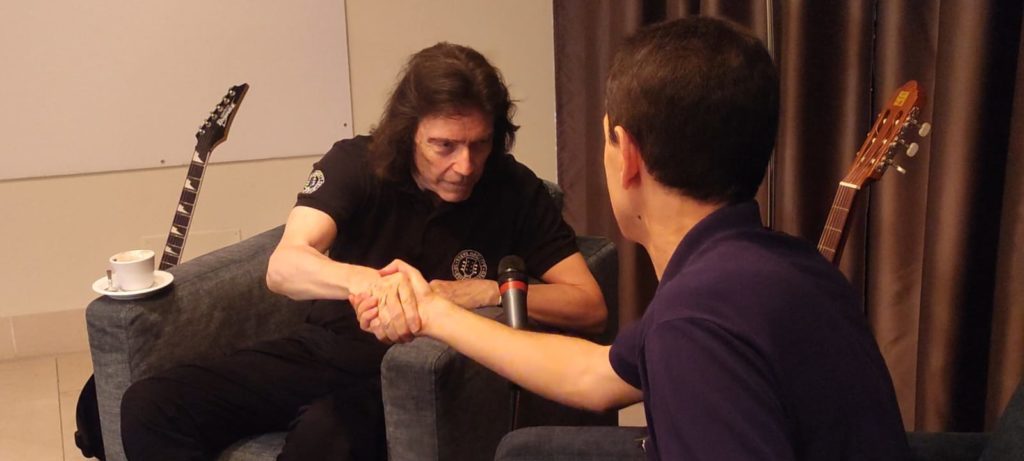VeroRock interviewed Steve Hackett during the Rome leg of the summer 2023 “Foxtrot at fifty + Hackett highlights” tour. The legendary British guitarist left Genesis in 1977 after six years spent in the band to pursue a brilliant solo career.
VeroRock: Hi Steve, thank you so much for accepting to be interviewed by us of VeroRock. First of all, how are you and how is the European tour going?
Steve Hackett: Very very good, we played last night in… where was it?
VeroRock: Carcassonne, Pistoia!
Steve Hackett: Pistoia! Oh, start again! (laughs)
VeroRock: Huge crowd in Pistoia!
Steve Hackett: It was very, very good. The shows start later than they do in the UK, so 9.30. And then, of course, you get to bed late so I did not get quite as much sleep as I would normally do. We were still awake at 4.30 in the morning, it was kind of crazy night! Tours are very exciting and… big crowds, little sleep!
VeroRock: A question regarding your new album. The follow up to Surrender of silence will be a concept album. Can you tell us what inspired the music and the lyrics? Does the album have a title and when will it be released?
Steve Hackett: Right, well, it is always unlucky to say it is going to be called this and it is released this time etc… because only yesterday we were having a conversation of that to make it good because we are doing so many shows it is very hard to finish it because my touring schedule is very tight. I will start recording when we get back, we do have a working title, we do have a working concept and it will be released some time next year. Whether I finish early or not it depends on the sessions that I have with Roger King (keyboards, programming and orchestration, editor’s note) and with the availability of musicians, all the practical things that you know, the dream is one thing, the practical thing is something else. All I can say is that I absolutely love it, I adore it, it is multifaceted.
VeroRock: What inspired the music and the lyrics?
Steve Hackett: Again, conversation with my lovely Jo (his wife Joanna Lehmann, editor’s note), we write together, we come up with ideas together. She pushes me in a good way I think to not repeat myself but to do something new each time. So, when we were in lockdown doing various things such as Surrender of silence, Under a Mediterranean sky (his latest acoustic album, 2021, editor’s note), the live albums, finishing that and the book (his latest autobiography A Genesis in my bed, editor’s note), all of these things were very much what we come up with together, subject ourselves to these extraordinary schedules. All I can say is that it is a very good album and it is revealing itself bit by bit.
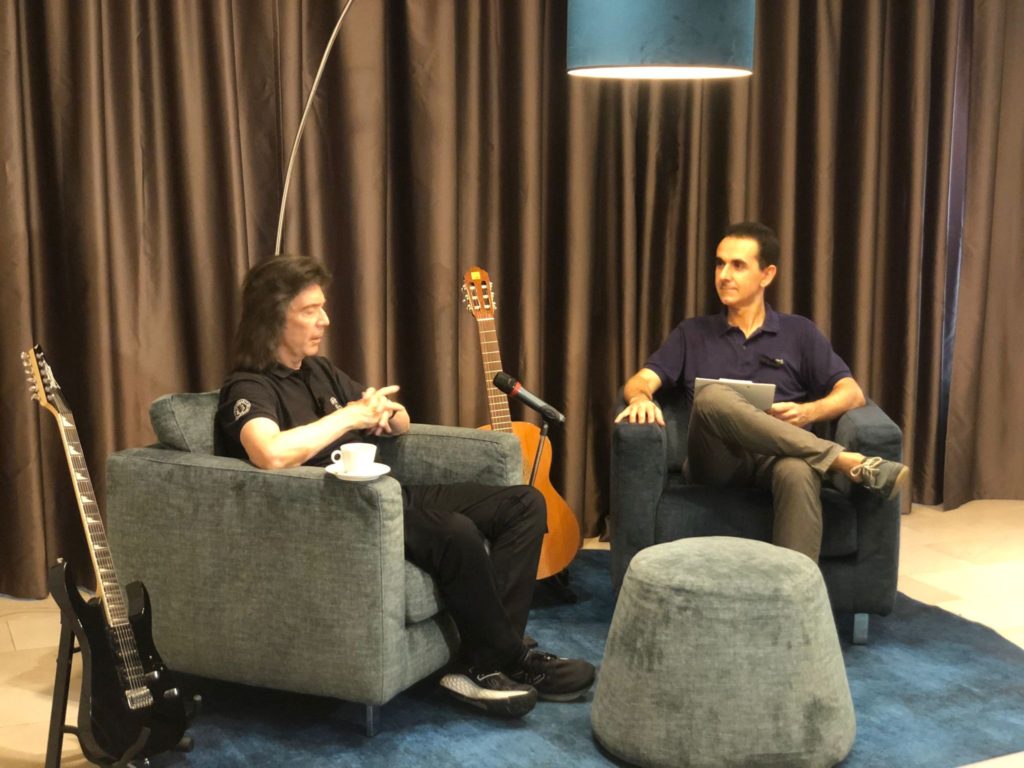
VeroRock: Which innovative elements did you introduce in this album?
Steve Hackett: Well, as I say it is a work in progress. All I can say is that the approach is slightly different, I think. Because it is a story, I am approaching it like orchestrating a film. I think you come up with different music if you have a story or a concept because you are doing programme music for something. I wanted to be inclusive of course, and permissive and all these alternatives to the word progressive. I think it will have all the elements of what I hope will be a great album.
VeroRock: You began playing harmonica around the age of two and guitar around the age of twelve, if I am not mistaken. Why are these two instruments your favourite? What makes them so special to you?
Steve Hackett: Well, let us start with the harmonica. I was talking to Herbert Kretzmer, a guy who did the libretto for a very famous musical in London, Les Misérables (the famous novel by Victor Hugo, 1862, editor’s note). He thought that harmonica was a wonderfully versatile little instrument, it is because it does not sound the same if a child is playing it or if Bob Dylan, Larry Adler, Toots Thielemans, Stevie Wonder or all of the extraordinary blues players – there have been so many of them – are playing it. It is a single line instrument of course, but you have this thing where you can play in one key but if you have the chromatic thing you can play it in all keys because you have the ability to change key with the button on the end of it. It is the blues harmonica that it is the one that I think, although there are not so many notes, the amount of expression you can get into one note – vibrato and wah with the hand – and then if you amplify it, it can sound like a trumpet, like a guitar, like all sorts of things. It is the instrument I grew up with you see, I was playing show tunes on it and folk music and all that and when I was listening to the Rolling Stones for the first time I did not realise what I was hearing was blues and I thought “yeah, I can do that too!” and I learnt to bend notes and do all that kind of stuff. So, a very expressive little instrument. As regards guitar, I bought guitar records from a very early age, in the late 1950s and the early 1960s guitars all sounded like cowboy tunes or like spy themes, you just had the guitar sounding “twang!” you know a bit like the James Bond theme or like Bonanza (an American Western television series that ran from 1959 to 1973, editor’s note) and then guitars started to emulate the human voice, again they started to sound like other things, they learnt to sustain and scream and again in the hands of the blues players like Muddy Waters and other players it started to evolve and it became something else.
VeroRock: So they are both very expressive instruments.
Steve Hackett: Yes, it started to change. Before you had synthesizers being out there the guitar was doing that.
VeroRock: It was a forerunner.
Steve Hackett: Yes, it was a forerunner and I think the electric guitar, the acoustic guitar, the classical guitar is a bit like the guitarist’s answer to the piano, it has a wide dynamic, it can do many different things, it is another instrument entirely and I fell in love with both aspects of it.
VeroRock: Guitar Noir and Darktown are considered by many two Hackett milestones (especially the first one). How important were these two albums for your career?
Steve Hackett: Well, I think they were done during a time when the music business was in transition I think from the idea of people having hit singles to the idea of perhaps returning to a style that was recognisable for fans and not worrying about competing in the marketplace but just being true to yourself. So, it was a kind of return to that.
VeroRock: A return to your musical roots.
Steve Hackett: Yes, I think so, a return to being or sounding more like yourself. The idea of commercial music is very much an oversubscribed club where a lot of people are trying to have commercial hits and, as a result, all sounding very similar. I tried to avoid that.
VeroRock: You recently celebrated both Genesis and your solo albums. 2024 will mark the 50th anniversary of The lamb lies down on Broadway, an iconic yet controversial album. Will you somehow celebrate it and is there a chance to see it performed in its entirety? If not, why?
Steve Hackett: Well, I think it is an iconic album. My thoughts are that I will celebrate it in my own way. As far as I am concerned, I think the answer is to celebrate the tracks that I feel…
VeroRock: More guitar oriented?
Steve Hackett: Perhaps more guitar oriented but also the tracks where I think they survive intact within themselves rather than in the overall because you know that Genesis did the entire show and then The Musical Box (the world-renowned Canadian Genesis tribute band, editor’s note) did the entire show with the original stuff and I know that most die-hard fans and completists have seen all of that. So, I have to walk the line between this and slavishly being a curator in the museum of my own making wearing my curator’s hat. I think there is a lot of good stuff there with The lamb, there are some beautiful tracks, I love certain things such as The chamber of 32 doors, Fly on a windshield, ehm…
VeroRock: The Lamia.
Steve Hackett: The Lamia is a very good track as is the title track. There are some others that we were performing even before The lamb, you know, Liliwhite lilith was called The light before that, it had a lyric from Phil Collins and then it got adapted, etc… So, there are other things in there and things that are on the extreme as well. I can see tracks that were influential for other bands. It is the case, you know, do you intend to do those or not.
VeroRock: What is the spirit behind both Genesis Revisited projects and is there a substantial difference between Genesis Revisited I and II?
Steve Hackett: Originally, I had a conversation with Julian Colbeck (a former British keyboard player, editor’s note) when we had just recorded what became a live album as an acoustic duo in Sicily, in Palermo (There are many sides to the night, released in 1995, editor’s note). He thought that Yes fans regarded Steve Howe as the heart of Yes and he suspected, very flatteringly, that Genesis fans thought of me in the same way with Genesis. This sparked off a whole conversation where we talked about doing Genesis Revisited, I think the title was even his. He said “Perhaps we should to this as a live thing”. And then along the way we were talking about the best way to relearn or to teach people this stuff would be to do a studio album and I had an idea of doing an expanded version of Genesis to involve orchestra, The Royal Philarmonic Orchestra and friends from bands that had a similar history, especially my friends from King Crimson. Way back in 1971/1972 I had been involved on the albums of Peter Banks, Jan Akkerman, John Wetton, Phil Collins so there has always been a natural sort of crossover between these bands. The difficulty for fans is that they say “I would like to see you work with Peter Gabriel and with Phil Collins again” and “why don’t you put back the original team?” I felt the important thing was that the music survived, that the team be flexible. My friend Richie Havens was saying that the stuff we did on Please don’t touch (Hackett’s second solo album released in 1978, editor’s note) was the classical music of the future. You can think of it in that way but then it is the case of the classical music that you regard from the eighteen hundreds, we cannot have Tchaikovsky anymore and in the same way you cannot put together the original team, it is not going to happen. There are the live albums, of course.
VeroRock: You just mentioned the orchestra. Did you enjoy playing with orchestras and choir recently? Were you satisfied by the sonic outcome or were there at times any redundancies between the band and the orchestra?
Steve Hackett: No, I do not think there were any redundancies. I worked with the Heart of England Orchestra in the UK, some years ago we did a live thing at the Royal Festival Hall and we did a tour of the UK (in 2018 a live project titled Genesis Revisited Band & Orchestra: live at the Royal Festival Hall was released, editor’s note). Everything was sold out, everything was really great, fantastic! In Wuppertal we did essentially the same set but this was different, we had a choir as well, it was extraordinary really! (the Hackett band played three consecutive shows with the Sinfonieorchester Wuppertal and Amici del canto choir from April 14th to 16th 2023, editor’s note). There were a number of things that went on in our personal lives, not just me. It seemed as if something was dogging our footsteps: my wife Jo broke her hand and she had an operation on it and shortly after that at the end of one rehearsal I fell over and I infected my hand and it was very difficult to play particularly nylon guitar so I knew this was coming up and I was playing with a bandage on it and I was having to apologize to the audience “I am sorry I cannot play certain things” so that was a challenge. And then, after the first show Amanda Lehmann (singer/guitarist, special guest on many tour dates, editor’s note) had some kind of infection and could not sing because she lost her voice and then shortly after that on the same tour Rob Townsend (woodwinds, piano and voice, editor’s note) had an accident, he fell and had to have stitches in his mouth and was not able to play several shows. It felt as if we were jinxed, as if something was following us around! All of this was going on at this time. However, the shows were very good with the orchestra, we were all very nervous because we did not know what was going to work and I knew that I had to lead the charge and there I was, you know, a wounded soldier!
VeroRock: But everything went well!
Steve Hackett: Everything went well. I think the third night was the best because in the end I was tired of being nervous with my hand and everything and I just said to the crowd “We forget about getting our notes right tonight, there has been too much pressure with that, we just gonna have a party with everybody!” and it went absolutely wonderfully well! But, as I say, Amanda could only sing on the first night but she joined as an instrumentalist. I think the third show was great, it was quite something, they were a wonderful orchestra!
VeroRock: How and when did the idea of the fantastic Supper’s ready long guitar improvisation come together?
Steve Hackett: Well, I remember Peter Gabriel saying something about his take with Supper’s ready live. He said he felt that he was singing for his life at the end of it. So, it was obviously very emotional for him and I felt that playing guitar but not singing, you know, my version of the voice on that is what the guitar does. On record it is fade-out, fairly quick but there is a lot of guitars playing, I multi-tracked the guitars and harmony, tapping and various things at the end so I felt I had to deliver something with the guitar and every night we do it and it is slightly different. I also like playing the guitar up the octave with one of my pedals, it can play very high. It is getting a little shorter towards the end because the band finished long before I did and every time they had to wait for me! Ehi, time’s up!
VeroRock: You mentioned your band. Your present band has never performed as brilliantly as now. What are the key factors of this harmony and tightness on stage?
Steve Hackett: Well, I have to say I have worked with many wonderful musicians and singers, I have been very lucky but I think this is the best live band I have ever had and it was Nick Beggs (formerly the bass player of his band, editor’s note) who said that first of all, it was very generous of him because he was not involved in playing bass.
VeroRock: So, you think it is technically the best band.
Steve Hackett: I think the following: I have the best players of all the bands, I think what is the most attractive of this is that the team is absolutely right, whether they are playing my stuff or Genesis stuff, whether it is nostalgic or groundbreaking, they are a wonderful band. It is the same band that is on Surrender of silence and on other stuff and I was really thrilled with the production sounds. I think it is an incredible team, it is very hard not to think at them as a band, I know I am supposed to be the presiding ringmaster or whatever but because so much of this comes from band sensibility it is what an incredible band can do when they all get together. These guys blow me away every night!
VeroRock: You have more than fifty years of a successful career behind you. What are your biggest achievements and your biggest regrets (if any)?
Steve Hackett: My biggest achievements, oh my goodness! Well, Steve Tobin – a guy who does commercials and a friend of mine since the 1960s with whom we used to compare notes – said it was a funny thing but achievements seem so little in retrospect, when you are looking back it does not seem like you have achieved very much because you are looking forward to “what can I do next? Can I do it better next time?” But I tell you one thing I am very pleased about. I started playing nylon guitar with Genesis because that was not popular in rock. That started a little bit in 1973, there was more of it in 1974 and each year progressively I was doing that whether it was in the band or on my own. And then I noticed that nylon guitar started to creep a little bit into the work of Madonna, Sting and I thought that this thing that should not really work with rock’n’roll is being accepted somewhere along the line. Regrets? My only regret is that I was not with Jo much earlier in life and if I could have met her when she was just legal and I was already a young roué, this would have been great!
VeroRock: You and your wife Jo have known each other for a long time and are happily married since 2011. What is the secret behind your relationship and how does this strong bond affect your songwriting?
Steve Hackett: Well, I think because I am a swine and she is an angel, this is how it works, they both need each other, you know. I am joking! I think Jo is very sweet, very patient, very imaginative, very socially aware, she wants the whole world to do well, she cares about everybody not just me.
VeroRock: And it seems she is the real driving force behind your creativity, energy and vitality.
Steve Hackett: Absolutely! She is at the centre of everything, I am very lucky to have met her and I am later life now, you know and she puts up with my tantrums, my moods, all the things that people do not see when I am frustrated in the middle of the night when I cannot sleep and I am climbing the walls! I am always amazed she is there. We love each other and there is a lot of forgiveness that comes into that. She is the sweetest person that I have ever known and I am sorry if that makes every other man on the planet jealous but we cannot all have everything all at once! And I adore her, she is sitting there (Jo and a few other people are attending the interview, editor’s note).
VeroRock: Now, some questions about Genesis. What was your contribution to the growth of Genesis both musically and visually?
Steve Hackett: I am always asking myself this question. Some days I think I contributed a lot, other days I think I contributed very little. To be honest, and I am trying to be very honest, I think it was Phil Collins who said we are bound to influence each other. I had never been in a band that was making albums and doing shows, I had never really worked in a group so I did not know what he meant. Now, of course, I know exactly what he meant! So, you know, without him and without all of us there would not have been the Genesis that you know. A great chemistry and it is very unusual to have a band of five great writers with an elevated standard and I think we are all very lucky to find each other. I hope that explains some of it.
VeroRock: Where lies the beauty of Foxtrot and can it considered the real turning point for Genesis popularity?
Steve Hackett: Well, I am told it was a number one album in Italy. Now, I am trying to answer your other question as well about the visual side of Genesis. When I look back to Foxtrot altogether, I think some of the songs we played with Nursery Cryme were performed in front of audiences who did not always understand them. By the time we were doing Foxtrot, we had a light show. I was always interested in the presentation and always wanted Genesis to have a light show and to expand the keyboard setup with a mellotron. In those days if you wanted to have a particular keyboard sound, you had to have another keyboard.
VeroRock: So your contribution was aimed at expanding the sonic perspectives.
Steve Hackett: Yeah, I think that is a very good way of putting it and also visually because I think if you present complicated music in an engaging way physically, then you can make everything seem simple. In other words, people are watching a story with each song, none more so than with the opening which is Watcher of the skies. I remember when we were still writing the song and were at soundchecks trying it out. We were playing in big places such as Palasports and we were not big in the rest of the world. I remember it sounded fantastic when you heard the mellotron start up in these big places. So, I think the Italians always saw it classical in style and sounding like an orchestra.
VeroRock: A team of aliens!
Steve Hackett: A team of aliens, a science fiction story and, of course, with Peter Gabriel when he is in silhouette looking like an alien, where you could not see onstage. You know, that tableau at the beginning where you have black light, sometimes dry ice, sometimes smoke, the lighting trees, the muslin backdrop, the glow of that. Yes, so suddenly you are confronted with a team of aliens and my perception of that album has changed over time, I think, when you take the best of Foxtrot which is a gorgeous album and the best of Selling England by the pound this for me seems like a golden period of Genesis.
VeroRock: It does!
Steve Hackett: Yeah, for you? You have many different styles of music, something syncopated, something classical, many genres, many styles, pan genres, the sense of story, the Homeric journey through Greek literature, the spoken word, the bardic stuff, the poetry of the wonderful lyrics and the ambiguity of the first track, Watcher of the skies, even if you do not know what it means. Somehow, it was groundbreaking and then, I love doing live what could not be done then: to be able to do Horizons, Can-utility and the coastliners and play the album in its entirety without any introduction to anything, people know we are going to do that and to take it to the spiritual home which is here in Italy where it was first embraced and understood and well accepted. It is a joy to bring it here.
VeroRock: What are the positive aspects – both from a musical and a personal point of view – of being part of Genesis?
Steve Hackett: Well, we learnt from each other and I think we still do even if we pretend we do not! Yes, everybody does! (laughs). To compliment each other privately and to compete with each other publicly, it is a crazy thing! The positive aspects are far outweigh the negative aspects. A fantastic band and it is important for me that the early work was celebrated by none other than John Lennon who considered Genesis to be true sons of the Beatles and this was from Nursery Cryme onwards.
VeroRock: The biggest compliment!
Steve Hackett: It is the biggest compliment. Every time I think to myself “Hey, you know, maybe… no, hang on a minute!” Even with the little song reminding me of one of the first things that I wrote with Phil Collins, For absent friends, I know that we had Eleanor Rigby in mind because we were thinking of the English and the idea of writing a song of compassion about people who were of a certain age, two old ladies instead of one old lady whose passing was celebrated in one song. The Beatles were amazing but Lennon picked up on that you know and I think “God, isn’t that wonderful?” You can dismiss whatever anyone says but you cannot dismiss what he said. It is a bit like Shakespeare saying: “Hey, I like your playing man! Okay, let us keep it coming”.
VeroRock: One adjective to define seven people: Peter Gabriel, Phil Collins, Tony Banks, Mike Rutherford, Anthony Phillips, Ray Wilson, Richard Macphail. Peter Gabriel visionary? I suggest.
Steve Hackett: Let me come up with one word for all of them: they are all individually brilliant! So, I would not say, you know, what separates them, I would say what unifies everybody: brilliance! And everyone have best a tremendous amount of compassion, I think.
VeroRock: Last question and the interview is, sadly, over. You claim in your autobiography to have attended a Genesis gig on the Duke tour. Where was it and how was your experience as a concert viewer? What impressed you the most?
Steve Hackett: Well, I always wanted to push Genesis towards doing a spectacular live show. For the first time it was like being on stage and off stage at the same time and I dreamt this sort of thing many times subsequently! Fifty per cent of the material they were doing at that time was stuff that we did and wrote together. So, it was so powerful for me, I could not sleep all night afterwards!
VeroRock: Was it in London?
Steve Hackett: Yes, it was in London, it was at Hammersmith but I cannot remember the exact date.
VeroRock: No, I think it was not at Hammersmith, it was in a little venue (I was erroneously thinking of the performance at the Lyceum Ballroom either on May 6th or 7th, editor’s note).
Steve Hackett: No, it was definitely Hammersmith! (Hackett remembers very well, Genesis played there for three consecutive nights, from March 27th through 29th, editor’s note).
VeroRock: So, they impressed you.
Steve Hackett: Yes, it was very impressive, it was very good. There was only one criticism: everyone was amazing but the guitar was too quiet. I thought “why is the guitar too quiet? Why is it diminished? It should be louder in the mix!”
Verorock: Maybe because Steve Hackett was not there anymore! (laughs)
Steve Hackett: No, no! But apart from that I thought that the standard of it was so high, everyone was amazing on stage, I could not sleep afterwards because I realised it was job done, the dream had been completed but at the same time I knew that I did the right thing because, ehm…
VeroRock: You already has a great career up to that point, you had already released Defector (Hackett’s fourth solo album released in 1980 that coincided with his commercial peak, editor’s note)
Steve Hackett: Well, sometimes you have to be unpopular to be popular and that is something that, you know, you have got to make a sacrifice in a way in order to make something else. I think I would not be doing what I am doing today which is, if I may say so proudly, doing new albums of, if I can say this, work that I love to the same degree that I did with Genesis imbued with as much feeling as that, and at the same time bring back the dream that was Genesis and trying to expand upon it and not just do it with a band and a light show but also sometimes with orchestra, with special guests to take it on and the evolution of that to include woodwinds and brass and jazz players and people who are capable of taking it to the next level. All of that I think, is job well done and I am still working on it you know. The cathedral is being built out of matchsticks and we hope that it does not get blown over by a sharp wind!
VeroRock: Steve, thank you so much for being with us. See you next time!
Steve Hackett: Thank you!
VeroRock would like to thank STEVE HACKETT and JOANNA LEHMANN for their courtesy and helpfulness.
The video interview can be viewed on the VeroRock.it Youtube channel at the following link:


